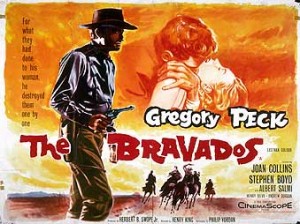Appropriately enough, since most of the films represented were made by 20th Century-Fox, the CD transfer opens with that studio’s trademark drum roll and fanfare, composed by Alfred Newman; he added the CinemaScope extension in 1953 for the first film made in that wide-screen process, The Robe. The music that follows is the “Street Scene” from How to Marry a Millionaire, with Gershwin-like hints. Alfred Newman’s contrast of ideas and gift for melody, however, elevate the music above a mere pastiche. (It’s well to note that the studio trademark music is absent in Dragonwyck, as it is in The Ghost and Mrs. Muir, Twelve O’Clock High, Beneath the 12-Mile Reef, The Mephisto Waltz and many others.)
Those three-minute tidbits of music, hardly long enough for the listener to become involved, include “London Calling,” with its lovely violin solo, from The Best of Everything; a breezy “Hornpipe” from Down to the Sea in Ships, more like a Virginia reel than a sailors’ dance; “Cathy’s Theme” from Wuthering Heights; and main titles from Airport, Anastasia and The Bravados.
 The Bravados excerpt, called “The Hunters,” is in the blockbuster Western category, for it is arresting, with that incessant beat—and Gerhardt and his band bring it off with . . . what’s that pet word of the critics? . . . oh, yes . . . panache. Anastasia, of course, was Ingrid Bergman’s come back film after what then ranked as a “scandal,” her baby-producing affair with Roberto Rossellini.
The Bravados excerpt, called “The Hunters,” is in the blockbuster Western category, for it is arresting, with that incessant beat—and Gerhardt and his band bring it off with . . . what’s that pet word of the critics? . . . oh, yes . . . panache. Anastasia, of course, was Ingrid Bergman’s come back film after what then ranked as a “scandal,” her baby-producing affair with Roberto Rossellini.
Now for the three longer excerpts. The Song of Bernadette tells the story of the young girl who saw that “beautiful lady.” The Prelude recorded here was composed for the original roadshow and played before the film began, not the main title heard in the film. In “The Vision” which follows, Newman underplays any saccharine spiritual overdose; instead, he quietly suggests what was happening around Bernadette—the wind, the sounds, the changes in light, as witnesses described them at the time. Here Newman, who always seemed peculiarly attuned to religious subjects, makes this episode one of the highlights of the disc. The choral accompaniment by the Ambrosian Singers adds to the impact of the music.
 Alfred Newman’s religious affinity is reinforced in the eight-minute suite from The Robe. While he can’t top Rózsa in writing music for ancient Roman epics, he does create a dramatic sweep in the main title, and “Caligula’s March” is as barbaric and demented as the villain the music portrays. The best parts of the suite are the “Elegy,” with its haunting simplicity, and “The Map of Jerusalem,” Diana’s farewell to Marcellus (Jean Simmons and Richard Burton).
Alfred Newman’s religious affinity is reinforced in the eight-minute suite from The Robe. While he can’t top Rózsa in writing music for ancient Roman epics, he does create a dramatic sweep in the main title, and “Caligula’s March” is as barbaric and demented as the villain the music portrays. The best parts of the suite are the “Elegy,” with its haunting simplicity, and “The Map of Jerusalem,” Diana’s farewell to Marcellus (Jean Simmons and Richard Burton).
And what should have been the highlight of the recording is a disappointment. This music is perhaps Newman’s signature piece, the “Conquest” March from Captain from Castile, prefaced here by “Pedro and Cataña” (Tyrone Power and Jean Peters). The playing of the love music is fine, its beauty equal to “Cathy’s Theme” from Wuthering Heights, but the performance of the march is uneven in tempo and the Band of the Grenadier Guards seems uncommonly ragged at times. For a better interpretation, see Erich Kunzel’s “Masters and Commanders” Telarc CD (80682), the one misnomer score on a disc otherwise devoted to “music for seafaring film classics”! Or any of Newman’s own interpretations are outstanding.
Airport was Newman’s last film score. Although no music from the score is included in the second Newman CD I’m to mention, those liner notes do include two photos of the composer at the time of the Airport scoring. Newman looks haggard and a bit emaciated, with the proverbial cigarette hanging from his lips. And in practically every photograph of Bette Davis and Leonard Bernstein, to cite two other habitual smokers, there’s a cigarette between their fingers—they were always smoking. Alfred Newman died in 1970, three weeks before the premiere of Airport, from complications of emphysema, much as Bette and Lenny died of lung cancer. This digression seemed necessary. Why, oh, why do people smoke?
————————————————————————————————-
Although recorded twenty-three years after the RCA, the sound on this Koch “Tribute to Alfred Newman” (3-7376-2H1) isn’t that much better, demonstrating in the RCA recording the fabulous, world-famous combination of engineer Kenneth Wilkinson and that acoustic marvel, Kingsway Hall, London. In the Koch, Richard Kaufman conducts the New Zealand Symphony and its Youth Choir.
The selections here, however, paint something of a different, clearly more substantial picture of Alfred Newman. There’s only one track in the three-minute vicinity, the love theme from David and Bathsheba. It contains one of those string melodies that are dead giveaways of a Newman score, played, as it were, in “the Hollywood style,” with luscious sound and much vibrato.
Speaking of marches, Newman creates another foot-stomper in “The Trek” from Brigham Young—Frontiersman, a ludicrous film with several miscastings, but what music! This arrangement by Fred Steiner is made even more effective by the inclusion, in the trio, of a Mormon hymn, “The Spirit of God Like a Fire Is Burning.” A stirring end to the disc.
One thought to “Dragonwyck (1946) with Gene Tierney”